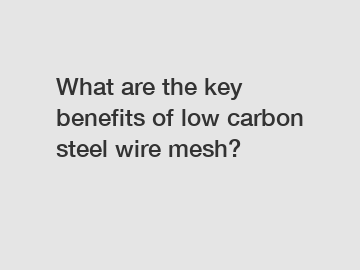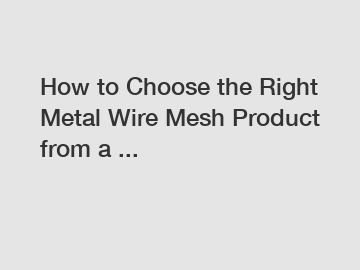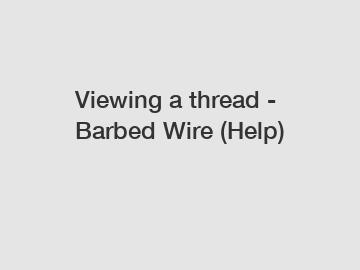**How Do Stainless Steel Mesh Specifications Work?**Stainless steel mesh specifications may seem complex at first glance, but understanding the basics can help in selecting the right type for your needs. Here’s a structured breakdown of how these specifications function:1. **Material Composition** - Stainless steel is classified into several grades, primarily defined by the chromium and nickel content. Common grades include: - Grade 304: General-purpose grade, excellent resistance to corrosion. - Grade 316: Contains molybdenum for improved resistance to saltwater and acidic environments.2. **Wire Diameter** - The diameter of the wire used in the mesh directly affects its strength and filter performance. Specifications will often list this as a range: - Common diameters: 0.005 inches to 0.250 inches. - Thicker wires offer more strength but less flexibility.3. **Mesh Aperture** - The size of the openings in the mesh, or aperture, plays a crucial role in determining its applications: - Measured in inches or millimeters. - A typical range might be from 0.2 mm (fine mesh) to 25 mm (coarse mesh).4. **Mesh Count** - The mesh count refers to the number of strands in a specific area, generally specified per inch: - A higher count indicates a finer mesh (more openings per inch). - Common counts range from 4 to 300.5. **Weave Type** - Different weaving techniques impart distinct properties to the mesh: - Plain weave: Simple and uniform, used for basic applications. - Twill weave: Offers better strength and flexibility. - Dutch weave: Suitable for filtration, combining fine and coarse wire.6. **Finish Types** - The finish of stainless steel mesh can influence its durability and aesthetic appeal: - Mill finish: Basic and commonly used. - Electro-polished: Provides improved corrosion resistance and surface smoothness. - Passivated: Chemically treated to enhance resistance to oxidation.7. **Chemical Resistance** - Understanding the environments where the mesh will be used is essential, especially concerning chemical exposure: - Grade 316 is often recommended for marine applications or chemical processing due to its superior resistance.8. **Physical Properties** - Some specifications will include details about tensile strength, elongation, and yield strength: - Tensile strength: Indicates the maximum load the mesh can withstand without breaking. - Elongation: Measures how much the material can stretch before breaking.9. **Applications** - Different specifications cater to a variety of industries and uses: - Architectural: For decorative mesh panels. - Industrial: Used in filtration systems and screens. - Automotive: For exhaust and heat-resistant applications.10. **Standards and Certifications** - International standards and certifications ensure that the mesh meets predetermined criteria: - ASTM E11: Standard specification for wire cloth and mesh. - ISO certifications for quality assurance.By breaking down the specifications into these categories, it's easier to comprehend what to look for when selecting stainless steel mesh. Whether it's for industrial use, architectural designs, or filtration systems, knowing these details will help ensure that you choose the correct product for your specific needs.
If you are looking for more details, kindly visit Plain woven wire screen specifications, Quarry Screen pieces wholesale, woven wire quarry screens price.
Additional reading:Stainless Steel Wire Roll ~ 100' x 48" -What are the best screens for windows?Is ODM Hexagonal Netting the Solution to Your Outdoor Durability Challenges?How to choose the right wire mesh product?What are the benefits of stainless steel filter mesh?Top FAQs About Sheep Fencing: Your Exporter Guide UncoveredBrandt King Cobra Shale Shaker Screen for Oil RigAdditional reading:Is Low Carbon Steel Mesh the Future of Sustainability?How Do Temporary Fences Impact Australian Events?Tubular Steel Fencing vs. Aluminium FencingWhat is the purpose of welded mesh?What is the Advantage and Disadvantage of Brandt VSM 300 Primary Steel ScreenWhat is ceramic foam filter?What Makes 12x10 Epoxy Coated Wire Mesh Ideal?










Comments
All Comments (0)